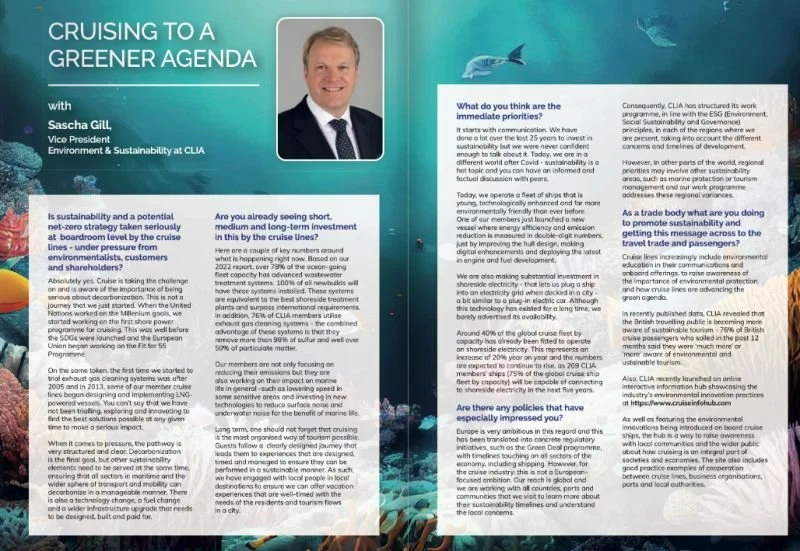Is Inland Waterway Transport ready for ISO?
Inland waterway transport is becoming more and more popular worldwide. Be it because states have set themselves ambitious goals for shifting transport to water. Be it because this form of travel is becoming more and more popular. On the other hand, there are challenges such as lower water levels, a change in sustainability awareness, a lack of licensed shipmasters or a lack of a higher-level management system. It is high time for a change of course in order to follow a uniform standard on all inland waters and to drive decarbonisation. The new draft standard Safety and Sustainability Management System ISO/CD 28701 is based on ESG principles and standardizes existing regional regulations in an international, certifiable system. We, the Schweizerische Normen-Vereinigung (SNV), spoke with Sascha Gill (DR) who is one of the initiators and convenors of the ISO/TC 8/SC 7/WG 1 working group.
SNV Story #4: Management system in sight!
Too much in the river, too many rules, too little international
A captain on the ocean faces a major challenge: the sea itself. A captain on a river has to contend with more diverse elements: traffic, bridges, water scarcity, shoals, narrow traffic routes, and so on. Every ship at sea is subject to the international standard SOLAS (Safety of Life at Sea) of the International Maritime Organization (IMO). And what standard does a captain of a riverboat follow? "To date, unfortunately, none that is internationally applicable. Depending on the river, a state law, a regional ordinance or the requirements of a river commission are used. For example, the CCNR (Central Commission for Navigation on the Rhine) has very clear rules. But as the name suggests, these are only valid for the Rhine.
This situation is particularly challenging for companies that operate internationally and employ people from a wide variety of countries. General management systems such as ISO 9001 for quality or ISO 45001 for occupational health and safety are not specific enough for inland navigation and are therefore rarely certified on the river," explains Sascha Gill. It's easy to imagine the effects: Employees who travel on different bodies of water have to constantly adapt to their daily work. Companies with a global fleet have to adapt their ships, their crew and their processes to a wide variety of rules. This state of affairs will be further exacerbated by the expected increase in traffic in Europe, as the "EU Climate Protection Package: Fit For 55" places a clear focus on the waterway as a transport network for goods.
Transport on EU waterways
2023: 16,000 vessels
2050: 25,000 vessels
Change of course: internationally certified safety and sustainability
There is one person on the ship who bears the overall responsibility: the captain. Everyone has their own experiences and derives the rules for how security works. In commercial river shipping, there are also many small individual companies, some of which operate with only one ship. "Let's take the example of evacuation. Depending on the captain, company regulations, region or crew experience, evacuations are carried out differently. If a crew member or captain changes ship, company or place of work, everything can suddenly be different. This often does not have an immediate impact on security, but it is confusing and involves a great deal of effort for the employees, but also for security forces who operate from land," Sascha Gill specifies. "In ocean shipping, the rules are optimized after every accident in order to better protect people and the environment. Certainly also due to the fact that such events are often very effective in the media and there is the global organization IMO that takes care of these things. In river navigation, those responsible also optimize for mistakes, but usually only on a local scale and not with global impact. The motivation of the initiators of the new management system was to close this large gap as quickly as possible and to develop a certifiable system." In addition to sustainability aspects and security, the increasingly stringent accounting requirements also play a major role. In the future, every company will have to report transparently on its economic, ecological and social commitment in addition to financial figures. In most cases, management teams in the industry lack the knowledge, clear guidelines and recommendations for action. An industry-specific standard also closes this gap. It provides users with practical solutions on how to collect the relevant information and process it in accordance with local rules.
Language problems lead to misunderstandingsThere is no uniform language on European rivers. This is a major challenge for international employees. An international standard creates clarity in everyday life. A crew moving from one ship to another or from one body of water to another must easily find, understand and know how to apply the most important rules.
ISO gives the go-ahead for an MSS
The initiators have submitted an application to the responsible Technical Committee (ISO/TC 8/SC 7) for the development of a new Management System Standard (MSS). "Due to the need for the action described, it was not difficult to obtain approval for a new MSS. The decisive factors were the urgency, the already carefully prepared design and the fact that the new MSS is not a competitor to previous solutions such as MSS for quality (ISO 9001), occupational health and safety (ISO 45001), environment (ISO 14001), energy (ISO 50001) or risk management (ISO 31000)." It was also important to clearly define the intended use of the MSS. The scope of the standard "ISO/CD 28701 Safety and Sustainability in Inland Waterway Transport" to be developed is defined as:
1. commercial shipping
2. on inland waterways (rivers, lakes, etc.),
3. for freight, cruise, ferry and passenger ships,
4. with a length of more than 24 meters,
5. as well as for the shore operation that supports the ship.
The new management system standard will be designed in such a way that it can be pragmatically introduced and implemented by both small and large companies. One key instrument will be the risk assessment, which is clearly described and will be the starting point for the measures to be taken. In doing so, the system also takes into account local jurisdiction. This is especially important in Europe, as the laws on the Rhine are very precise and extensive. The draft ISO/CD 28701 standard does not compete with the local rules but guarantees that all rules are comprehensively taken into account. The new MSS thus becomes a clear management tool.
The first draft clearly sets the course
Thanks to a mature and thoughtful first draft, which was about 30 pages long, the whole process of development went surprisingly fast. "During the elaboration, we proceeded according to the 10 logical topic blocks, i.e. ISO sections of an MSS. Everything was created from scratch, nothing was written off from existing MSS. "I was very impressed by the speed with which the Swiss Association for Standardization (SNV) helped and drove decisions forward. Coming from Austria, I expected a more leisurely pace for standardization work. Thanks to the consistent approach, we will be able to make our contribution to safety and decarbonization more quickly." Since the start of work in June 2022, the working group has worked out the complete management system in just a few meetings. It is scheduled to come into force in 2024 and interested parties will be able to be certified from then on. There is a great deal of interest because certification also increases the attractiveness of a provider. The target group of the new standard is broad – from shipping companies to shipowners, from security companies on land to owners of a single means of transport.
Focal points of ISO/CD 28701 Certifiable, internationally applicable, increases safety on board, contributes to decarbonization, is based on ESG principles, supports non-financial reporting
What was your biggest surprise in the standardization work?
"That the public image of standards is no longer up to date. Standards help, they bring structures and a clear result. Until now, I only knew standards as a user. Now that I have worked on the construct, I have noticed that the world of standards has modernized considerably and also addresses overarching social and ecological issues. Unfortunately, this has not yet reached the audience. My message to everyone is to engage with ISO and its regulations without judgement. If you apply and understand them correctly, they bring clear added value to everyone."






